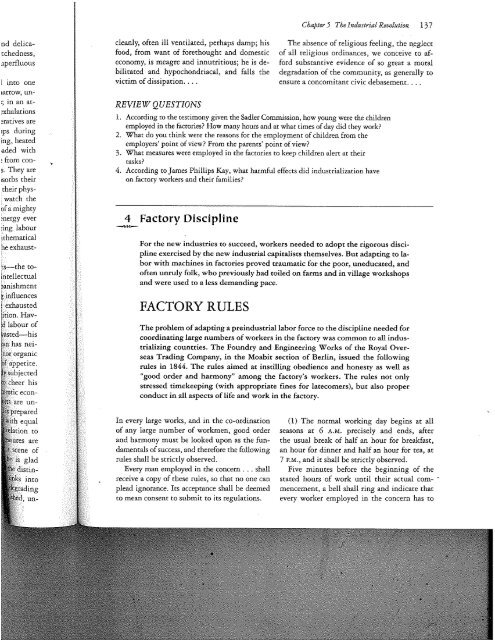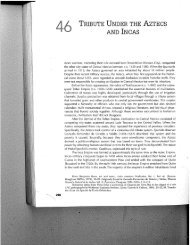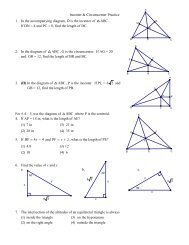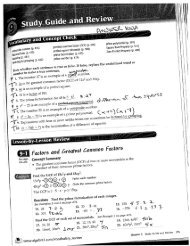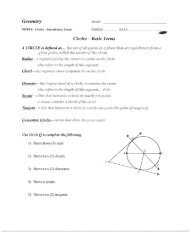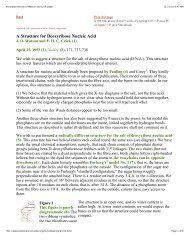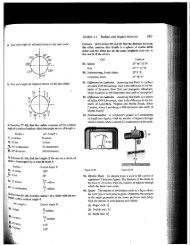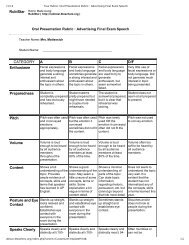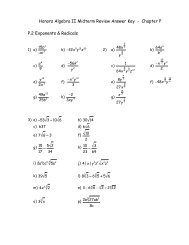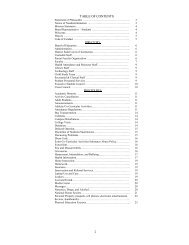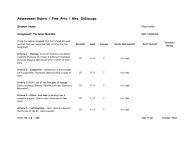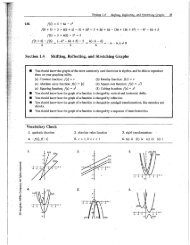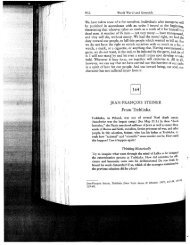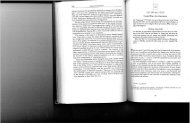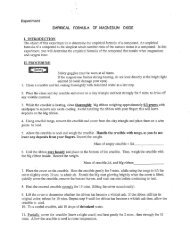FACTORY RULES
FACTORY RULES
FACTORY RULES
You also want an ePaper? Increase the reach of your titles
YUMPU automatically turns print PDFs into web optimized ePapers that Google loves.
Chapter 5 The Industrial Revolution 137<br />
nd delicatchedness,<br />
aperfluous<br />
~; in an at-<br />
~xhalations<br />
~ps during<br />
ing, heated<br />
~ded with<br />
~ from cons.<br />
They are<br />
isorbs their<br />
their physwatch<br />
the<br />
~fa mighty<br />
inergy ever<br />
ing labour<br />
ithematica!<br />
fie exhaust-<br />
’S--the<br />
{fitellectua!<br />
Banishment<br />
i influences<br />
exhausted<br />
i~ion. Haylabour<br />
of<br />
~ted--his<br />
~has neioFgamc<br />
his<br />
cleanly, often ill ventilated, perhaps damp; his<br />
food, from want of forethought and domestic<br />
economy, is meagre and innutritious; he is debilitated<br />
and hypochondriacal, and falls the<br />
victim of dissipation ....<br />
The absence of religious feeling, the n.eglect<br />
of all religious ordinances, we conceive to afford<br />
substantive evidence of so great a moral<br />
degradation of the community, as generally to<br />
ensure a concomitant civic debasement ....<br />
REVIEW QUESTIONS<br />
1. According to the testimony given the Sadler Commission, how young were the children<br />
employed in the factories How many hours and at what times of day did they work<br />
2. What do you think were the reasons for the employment of children from the<br />
employers’ point of view From the parents’ point of view<br />
3. What measures were employed in the factories to keep children alert at their<br />
tasks<br />
4. According to James Phillips Kay, what harmful eft~cts did industrialization have<br />
on factory workers and their families<br />
4 Factory Discipline<br />
For the new industries to succeed, workers needed to adopt the rigorous discipline<br />
exercised by the new industrial capitalists themselves. But adapting to labor<br />
with machines in factories proved traumatic for the poor, uneducated, and<br />
often unruly folk, who previously had toiled on farms and in village workshops<br />
and were used to a less demanding pace,<br />
<strong>FACTORY</strong> <strong>RULES</strong><br />
The problem of adapting a preindustrial labor force to the discipline needed for<br />
coordinating large numbers of workers in the factory was common to all industriaiizing<br />
countries. The Foundry and Engineering Works of the Royal Overseas<br />
Trading Company, in the Moabit section of Berlin, issued the following<br />
rules in 1844. The rules aimed at instilling obedience and honesty as well as<br />
"good order and harmony" among the factory’s workers. The rules not only<br />
stressed timekeeping (with appropriate fines for latecomers), but also proper<br />
conduct in all aspects of life and work in the factory.<br />
equal<br />
to<br />
are<br />
of<br />
In every large works, and in the co-ordination<br />
of any large number of workmen, good order<br />
and harmony must be looked upon as the fnndamentals<br />
of success, and therefore the following<br />
rules shall be strictly observed.<br />
Every man employed in the concern.., shall<br />
receive a copy of these rules, so that no one can<br />
plead ignorance. Its acceptance shall be deemed<br />
to mean consent to submit to its regulations.<br />
(!) The normal working day begins at all<br />
seasons at 6 A.M. precisely and ends, after<br />
the usual break of half an hour for breakfiast,<br />
an hour for dinner and half an hour for tea, at<br />
7 p.M., and it shall be strictly observed.<br />
Five minutes before the beginning of the<br />
stated hours of work until their actual commencement,<br />
a bell shall ring and indicate that<br />
every worker employed in the concern has to
!38 Part Two Modern Eu~vpe<br />
proceed to his place of work, in order to start as<br />
soon as the bell stops.<br />
The doorkeeper shall lock the door punctually<br />
at 6 A.M., 8:30 A.M., 1 i’.M. and 4:30<br />
Workers arriving 2 minutes late shall lose<br />
half an hour’s wages; whoever is more than 2<br />
minutes late may not start work until after the<br />
next break, or at least shall lose his wages until<br />
then. Any disputes about the correct time shall<br />
be settled by the dock mounted above the<br />
gatekeeper’s lodge.<br />
These rules are valid both for time- and for<br />
piece-workers, and in cases of breaches of<br />
these rules, workmen shall be fined in proportion<br />
to their earnings. The deductions from<br />
the wage shall be entered in the wage-book of<br />
the gatekeeper whose duty they are; they shall<br />
be unconditionally accepted as it will not be<br />
possible to enter into any discussions about<br />
them.<br />
(2) "When the ball is rung to denote the<br />
end of the working day, every wurkman, both<br />
on piece- and on day-wage, shall leave his<br />
workshop and the yard, but is not allowed to<br />
make preparations for his departure before the<br />
bell rings. Every breach of this rule shall lead<br />
to a fine of five silver groschen [pennies] to the<br />
sick fund. Only those who have obtained special<br />
permission by the overseer may stay on in<br />
the workshop in order to work.--If a workman<br />
has worked beyond the closing bell, he must<br />
give his name to the gatekeeper on leaving, on<br />
pain of losing his payment for the overtime.<br />
(3) No workman, whether employed by<br />
time or piece,.may leave before the end of the<br />
working day, without having first received<br />
permission from the overseer and having given<br />
his name to the gatekeeper. Omission of these<br />
two actions shall lead to a fine of ten silver<br />
groschen payable to the sick fund.<br />
(4) Repeated irregular arrival at work shall<br />
lead to dismissal. This shall also apply to those<br />
who are found idling by an official or overseer,<br />
and refuse to obey their order to resume work.<br />
(5) Entry to the firm’s property by any but<br />
the designated gateway, and exit by any prohibited<br />
route, e.g. by climbing fences or walls,<br />
or by crossing the Spree [River], shall be pun-<br />
!shed by a fine of fifteen silver groschen to the<br />
sick fund for the first offences, and dismissal<br />
for the second.<br />
(6) No worker may leave his place of work<br />
otherwise than for reasons connected with his<br />
work.<br />
(7) All conversation with fellow-workers is<br />
prohibited; if any worker requires information<br />
about his work, he must turn to the overseer,<br />
or to the particular fellow-worker designated<br />
for the purpose.<br />
(8) Smoking in the workshops or in the yard<br />
is prohibited during working hours; anyone<br />
caught smoking shall be fined five silver groschen<br />
for the sick fnnd for every such offence.<br />
(9) Every worker is responsible for cleaning<br />
up his space in the workshop, and if in doubt,<br />
he is to turn to his overseer.--All tools must<br />
always be kept in good condition, and must be<br />
cleaned after use. This applies particularly to<br />
the turner, regarding his lathe.<br />
(10) Natural functions must be performed ar<br />
the appropriate places, and whoever is found<br />
soiling walls, fences, squares, etc., and similarly,<br />
whoever is found washing his face and<br />
hands in the workshop and not in the places<br />
signed for the purpose, shall be fined five silver<br />
groschen for the sick fund.<br />
(11) On completion of his piece of work,<br />
every workman must hand it over at once to<br />
his foreman or superior, in order to receive a<br />
fresh piece of work. Pattern makers must on no<br />
account hand over their patterns to the foundry<br />
without express order of their supervisors.<br />
No workman may take over work from his<br />
fellow-workman without instruction to that<br />
effect by the foreman.<br />
(12) It goes without saying that all overseers<br />
and officials of the firm shall be obeyed<br />
without question, and shall be treated with<br />
due deference. Disobedience will be punished<br />
by dismissal.<br />
(13) Immediate dismissal shall also be the fate<br />
of anyone found drunk in any of the workshops.<br />
(14) Untrue allegations against superiors or<br />
officials of the concern shall lead to stern reprimand,<br />
and may lead to dismissal. The same<br />
punishment shall be meted out to those who<br />
knowingly allow errors to slip through when<br />
supercising or stocktakin&<br />
(15) Every workman is obliged to report to his<br />
superiors any acts of dishonesty or embezzlement<br />
on the part of his fellow workmen. If he omits to<br />
do so, and it is shown after subsequent discovery<br />
of a misdemeanour that he knew about it at the<br />
time, he shall be liable m be taken m court as an<br />
accessory after the fact and the wage due to him<br />
shall be retained as punishmeur. Conversely, anyone<br />
denouncing a theft in such a way as to allow<br />
conviction of the thief shal! receive a reward of<br />
two Thaler [dollar equivalent], and, if necessary,<br />
his name shall be kept confidenrial.--Further, the<br />
gatekeeper and the watchman, as well as every<br />
official, are entitled to search the baskets,<br />
parcels, aprons etc. of the women and children<br />
who are taking the dinners into the works, on<br />
their departure, as well as search any worker suspected<br />
of stealing any article whatever....<br />
REVIEW QUESTIONS<br />
1. Judging by the Berlin factory rules, what were the differences between<br />
preindustrial and industrial work routines<br />
2. How might these rules have affected the lives of families<br />
5 The Capitalist Ethic<br />
Chapter 5 The Industrial Revolution 139<br />
(!8) Advances shall be granted onl~y to the<br />
older workers, and even to them only in exceptional<br />
circumstances. As long as he is working<br />
by the piece, the workman is entitled merely<br />
to his fixed weekly wage as subsistence pay;<br />
the extra earnings shall be paid out only on<br />
completion of the whole piece contract. If a<br />
workman leaves before his piece contract is<br />
completed, either of his own free will, or on<br />
being dismissed as punishment, or because of<br />
illness, the partly completed work shall be<br />
valued by the general manager with the help<br />
of two overseers, and he wili be paid accordingly.<br />
There is no appeal against the decision of<br />
these experts.<br />
(19) A flee copy of these rules is handed to<br />
every workman, but whoever loses it and requires<br />
a new one, or cannot produce it on leaw<br />
ing, shall be fined 2 ~ silver groschen, payable<br />
to the sick fund.<br />
The remarkable advance in industry and material prosperity in the nineteenth<br />
century has been hailed as the triumph of the middle class, or bourgeoisie,<br />
which included bankers, merchants, fa.ctory owners, professionals, and government<br />
officials. Unlike the upper classes, which lived on inherited wealth,<br />
middle-class people supported themselves by diligent, assiduous activity--<br />
what has been called the cap*tal st (or bourgeoxs) ethic. A vigorous spirit of<br />
enterprise and the opportunity for men of ability to rise from common origins<br />
to riches and fame help explain the growth of industrialism in England. These<br />
industrial capitalists adopted the attitude of medieval monks that "idleness is<br />
the enemy of the soul," to which they added "time is money."<br />
The ideal 6f dedicated and responsible hard work directed by an internal<br />
rather than an external discipline was seen as the ultimate source of human<br />
merit and was widely publicized in the nineteenth century. It encouraged upward<br />
mobility among the lower classes and sustained the morale of ambitious<br />
middle-class people immersed in the keen competition of private enterprise. By<br />
shaping highly motivated private citizens, the capitalist ethic also provided a<br />
vital source of national strength.


